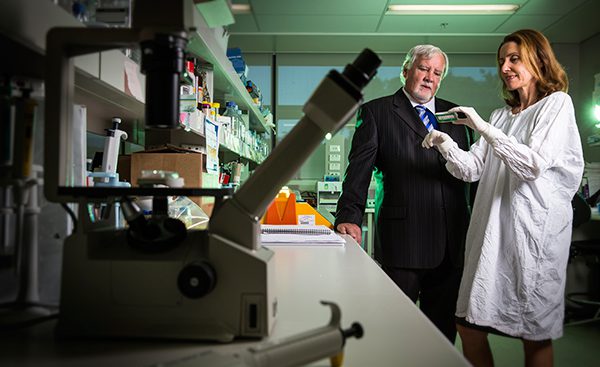A revolutionary cancer drug could be just years away if its University of Wollongong creators can find the money to back crucial testing.
After more than a decade of research and development, a team of University of Wollongong have created a chemotherapy drug that is poised to revolutionise cancer treatment.
Following extensive tests, the team is ready to put the Deflexifol to the test but needs millions of dollars to make it happen.
Primarily targeting gastro-intestinal cancer, Deflexifol has been found to control cancer progression without the harmful side-effects of traditional chemotherapy.
Professor of Cellar Molecular Biology Marie Ranson said the key to success was fusing Leucovorin (Follinic acid) and 5-Fluorouracil, two chemo-drugs that were previously unable to be combined.
“What we’ve done, is some clever chemistry to mix together Follinic acid with 5-Fluorouracil, to deliver the two compounds at the same time. The two together work much better at killing tumour cells,” Prof. Ranson said.
Phase 1 of testing saw Prof. Ranson and her colleagues experiment and investigate the drug in animal and human trials.
Phase 2 will involve testing on over 200 patients, which Prof. Ranson hopes will prove Deflexifol is more effective than any other cancer treatment currently in use.
“The ideal outcome would be to partner with a pharmaceutical company who would take on the Phase Two trial, and to prove that it is not only safe, but it is more effective than the current standard of care treatment,” she said.
Prof. Ranson said she was proud of the achievements, but was aware without proper funding the Deflexifol project will be stuck in limbo.
Prof. Ranson said the research is crucial but not cheap.
“To do that study, it requires at least $10 to 20 million to do, so we are trying to raise money to either do that, or find a company who will partner with us to do the trial,” she said.
If Phase 2 is completed and the results are positive, Prof. Ranson said Deflexifol could be available at cancer treatment centres worldwide within two years.

